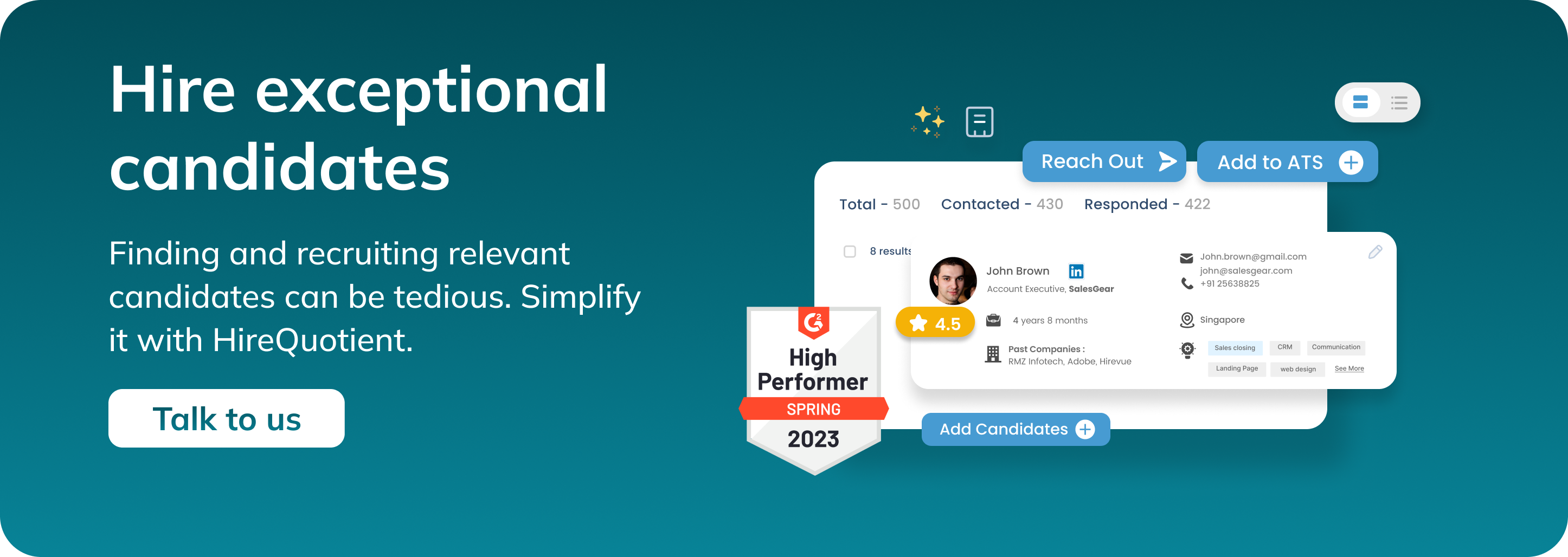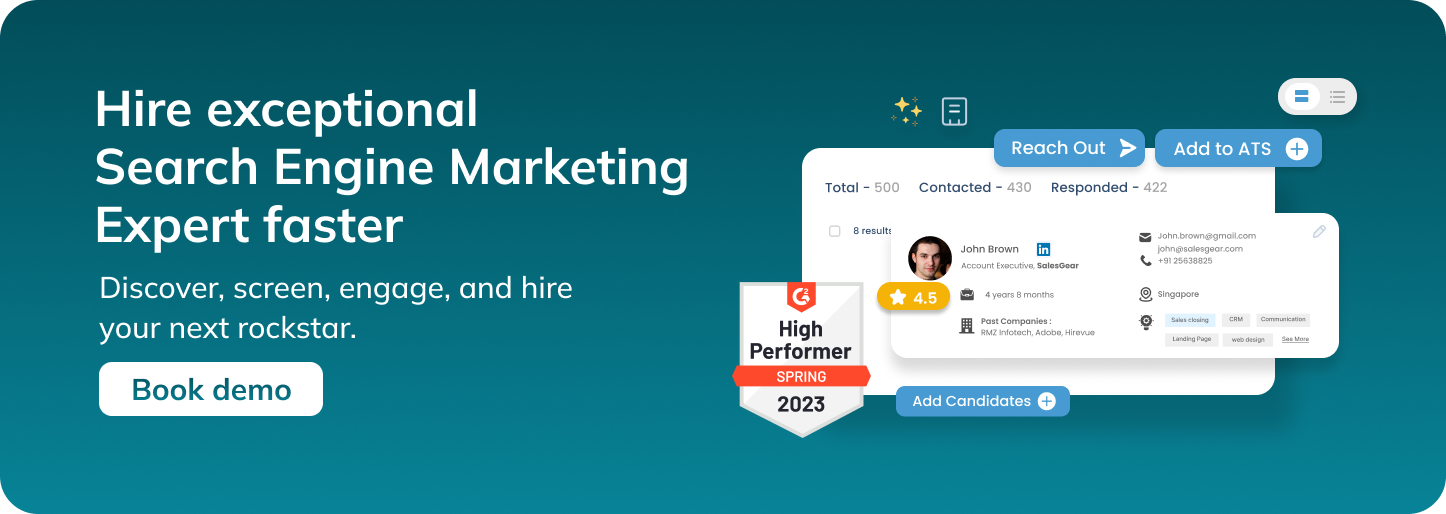Search Engine Marketing Expert Interview Questions and Answers
Published on February 6th, 2024
Hiring the right Search Engine Marketing expert is crucial for any organization aiming to enhance its online visibility and drive traffic effectively. Whether you're a hiring manager looking to assess fresh talent, mid-level professionals, or experienced veterans, the interview process must be comprehensive and insightful.
To aid in this endeavor, here's a breakdown of the top Search Engine Marketing Expert interview questions and answers tailored to different levels of expertise:
For Fresher Candidates
1. What is SEM, and how does it differ from SEO?
Answer: SEM stands for Search Engine Marketing, which involves paid advertising to increase a website's visibility in search engine results. SEO, on the other hand, focuses on optimizing organic search visibility without paying for placements.
2. Explain the concept of PPC (Pay-Per-Click).
Answer: PPC is a digital advertising model where advertisers pay a fee each time their ad is clicked. It's a way of buying visits to a website rather than earning them organically.
3. What are keywords, and why are they important in SEM?
Answer: Keywords are the terms or phrases that users enter into search engines when looking for information. They are crucial in SEM as they determine when and where your ads will appear.
4. How do you measure the success of an SEM campaign?
Answer: Success in SEM campaigns can be measured through metrics like click-through rate (CTR), conversion rate, cost-per-click (CPC), return on ad spend (ROAS), and overall return on investment (ROI).
5. What is Quality Score, and how does it impact PPC campaigns?
Answer: Quality Score is a metric used by search engines to measure the relevance and quality of your keywords, ads, and landing pages. It impacts the ad position and cost-per-click in PPC campaigns.
6. What is Ad Rank, and how is it calculated?
Answer: Ad Rank determines the position of your ad on the search engine results page (SERP). It's calculated based on your bid, Quality Score, and the expected impact of ad extensions and other ad formats.
7. How do you select relevant keywords for an SEM campaign?
Answer: Keyword research tools, competitor analysis, and understanding the target audience's search intent are essential for selecting relevant keywords.
8. What are the different match types in Google Ads?
Answer: The different match types in Google Ads are broad match, phrase match, exact match, and broad match modifier. Each match type offers varying levels of control over when your ads may appear.
9. Explain the importance of ad extensions in PPC campaigns.
Answer: Ad extensions provide additional information to your ads, making them more relevant and clickable. They can improve ad visibility, CTR, and overall campaign performance.
10. How do you optimize landing pages for SEM campaigns?
Answer: Landing pages should be relevant to the ad copy and keywords, have a clear call-to-action (CTA), load quickly, and be mobile-friendly to optimize SEM campaigns.
Also read: How to hire a perfect Search Engine Marketing Expert?
11. What are negative keywords, and why are they used in SEM?
Answer: Negative keywords are terms for which you don't want your ads to appear. They help refine targeting, reduce irrelevant clicks, and improve campaign efficiency.
12. How do you create compelling ad copy for PPC campaigns?
Answer: Compelling ad copy focuses on unique selling propositions (USPs), includes relevant keywords, has a clear CTA, and speaks directly to the target audience's needs and desires.
13. What is conversion tracking and why is it important in SEM?
Answer: Conversion tracking is the process of tracking and measuring actions that are valuable to your business, such as form submissions or purchases. It's crucial in SEM to evaluate campaign performance and optimize for better results.
14. Explain the difference between CPM and CPC bidding.
Answer: CPM (Cost Per Mille) bidding is based on the cost per thousand impressions, while CPC (Cost Per Click) bidding is based on the cost per click. CPM is typically used for brand awareness campaigns, while CPC is used for performance-driven campaigns.
15. How do you stay updated with the latest trends and changes in SEM?
Answer: Staying updated involves regularly reading industry blogs, attending webinars and conferences, participating in forums, and experimenting with new features and strategies offered by search engines.
For Mid-level Candidates
16. What are Dynamic Search Ads, and when would you recommend using them?
Answer: Dynamic Search Ads automatically generate ad headlines and landing pages based on the content of your website. They are recommended for websites with a large inventory of products/services or frequent website updates.
17. How do you approach bid management in SEM campaigns?
Answer: Bid management involves adjusting bids to achieve campaign goals, considering factors like keyword performance, competition, and budget constraints. Automated bidding strategies and bid adjustments based on device, location, and time can be utilized.
18. Explain the concept of remarketing in SEM and its benefits.
Answer: Remarketing targets users who have previously visited your website with tailored ads as they browse other sites or use search engines. It helps re-engage potential customers, increase brand recall, and improve conversion rates.
19. What are the key components of an effective SEM report?
Answer: An effective SEM report should include performance metrics (CTR, CPC, conversion rate, etc.), campaign objectives, insights, recommendations, and visualizations (graphs, charts) for easier interpretation.
20. How do you conduct A/B testing for SEM campaigns, and what elements do you typically test?
Answer: A/B testing involves creating two versions of an ad or landing page with one differing element and measuring their performance. Elements commonly tested include ad copy, headlines, CTAs, and landing page design.
21. What are the common challenges you've faced in managing SEM campaigns, and how did you overcome them?
Answer: Common challenges include fluctuating competition, changes in search engine algorithms, budget constraints, and maintaining campaign relevancy. Overcoming these challenges often involves proactive monitoring, strategic adjustments, and continuous learning.
22. Explain the concept of ad fatigue and how you address it in SEM campaigns.
Answer: Ad fatigue occurs when target audiences become desensitized to repetitive ad creatives, leading to a decline in performance. To address it, you can rotate ad creatives, refresh ad copy and visuals, and test new messaging and offers.
23. How do you leverage audience targeting in SEM campaigns?
Answer: Audience targeting allows you to reach specific groups of users based on demographics, interests, behaviors, and remarketing lists. Leveraging audience targeting can enhance campaign relevance and performance.
24. What role does landing page experience play in SEM campaigns, and how do you optimize it?
Answer: Landing page experience impacts Quality Score, ad rank, and conversion rates. Optimizing it involves improving page load speed, relevance to ad copy, usability, and ensuring a clear path to conversion.
25. Can you explain the concept of ad sequencing and how it can be used in SEM campaigns?
Answer: Ad sequencing involves showing a series of ads to users in a specific order to tell a cohesive story or guide them through a sales funnel. It can be used to nurture leads, cross-sell, or upsell products/services.
For Experienced Candidates
26. How do you approach budget allocation and forecasting for SEM campaigns?
Answer: Budget allocation involves considering historical performance, seasonality, business goals, and competitive landscape to distribute the budget effectively across campaigns and channels. Forecasting relies on data analysis and scenario planning to predict future performance.
27. What are the implications of Google's privacy updates, such as the removal of third-party cookies, on SEM strategies?
Answer: Google's privacy updates impact audience targeting, measurement, and attribution in SEM campaigns. Strategies may need to shift towards first-party data, contextual targeting, and alternative attribution models.
28. Explain the role of AI and machine learning in SEM, and how you leverage them in campaign management.
Answer: AI and machine learning technologies can automate bid management, ad targeting, ad creative optimization, and audience segmentation in SEM campaigns, leading to improved efficiency and performance.
29. What strategies do you employ for multi-channel attribution in SEM campaigns?
Answer: Multi-channel attribution involves assigning value to touchpoints across various channels in the customer journey. Strategies may include using algorithmic models, data-driven attribution, and integrating offline and online data sources.
30. How do you approach international SEM campaigns, considering language, cultural, and market differences?
Answer: International SEM campaigns require thorough localization of keywords, ad copy, landing pages, and targeting parameters to resonate with local audiences. Understanding cultural nuances and market dynamics is essential for success.
Also read: Search Engine Marketing Expert Job Description
31. What is the role of competitive analysis in SEM, and how do you conduct it effectively?
Answer: Competitive analysis helps identify opportunities and threats in the market, refine targeting strategies, and benchmark performance against competitors. It involves analyzing competitor keywords, ad creatives, landing pages, and bidding strategies.
32. How do you integrate SEM campaigns with other marketing channels for a cohesive strategy?
Answer: Integrating SEM with other channels like SEO, social media, email marketing, and offline channels ensures consistent messaging and maximizes reach and engagement across the customer journey.
33. Can you discuss the impact of voice search on SEM strategies, and how do you optimize for it?
Answer: Voice search presents new challenges and opportunities for SEM, requiring optimization for natural language queries, local intent, and featured snippets. Strategies may include targeting long-tail keywords, optimizing for mobile, and providing concise, relevant answers.
34. How do you assess the effectiveness of display advertising in SEM campaigns, beyond traditional performance metrics?
Answer: Beyond traditional metrics like CTR and conversion rate, assessing the effectiveness of display advertising involves measuring brand lift, viewability, engagement metrics (time spent, interactions), and cross-device attribution.
35. What role does data privacy and compliance play in SEM, and how do you ensure adherence to regulations like GDPR and CCPA?
Answer: Data privacy and compliance are paramount in SEM to protect user data and avoid penalties. Ensuring compliance involves obtaining user consent, implementing data encryption and anonymization, and partnering with compliant vendors.
Conclusion
Hiring the right SEM expert is crucial for driving online visibility and maximizing traffic. By utilizing a comprehensive interview process tailored to different levels of expertise, organizations can ensure they find candidates who possess the necessary skills and knowledge to excel in SEM roles.
Moreover, tools like EasySource can significantly streamline the recruitment process by providing advanced sourcing capabilities and outreach automation features. With its integration with LinkedIn and AI-powered suggestions, EasySource offers recruiters a powerful solution to efficiently source and connect with top talent in the industry.
As the digital landscape continues to evolve, having a skilled SEM team equipped with the right tools is essential for staying ahead of the competition and achieving marketing objectives. So, whether you're recruiting fresher candidates eager to learn or seasoned professionals with years of experience, investing time in the hiring process and leveraging innovative tools like EasySource can yield remarkable results in building a proficient SEM team.
Authors

Soujanya
As a technical content writer and social media strategist, Soujanya develops and manages strategies at HireQuotient. With strong technical background and years of experience in content management, she looks for opportunities to flourish in the digital space. Soujanya is also a dance fanatic and believes in spreading light!

Hire the best without stress
Ask us how
Never Miss The Updates
We cover all recruitment, talent analytics, L&D, DEI, pre-employment, candidate screening, and hiring tools. Join our force & subscribe now!
Stay On Top Of Everything In HR



